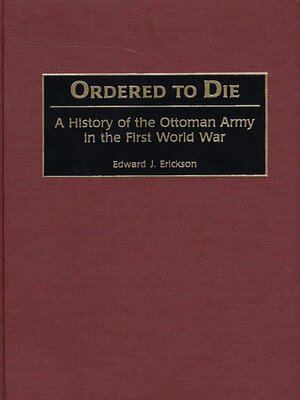Ordered to Die
ebook ∣ A History of the Ottoman Army in the First World War · Contributions in Military Studies
By Edward J. Erickson

Sign up to save your library
With an OverDrive account, you can save your favorite libraries for at-a-glance information about availability. Find out more about OverDrive accounts.
Find this title in Libby, the library reading app by OverDrive.



Search for a digital library with this title
Title found at these libraries:
| Library Name | Distance |
|---|---|
| Loading... |
The first general history in English of the Ottoman Army in the First World War, Ordered to Die is based on newly available Turkish archival and official sources. Outnumbered and outgunned, the Ottoman Army performed astonishingly well in the field and managed to keep fighting until the end of the war, long after many other armies had quit the field. It fought a multi-front war against sophisticated and capable enemies, including Great Britain, France, and Russia. Erickson challenges conventional thinking about Ottoman war aims, Ottoman military effectiveness, and the influence of German assistance.
Written at the strategic and operational levels, this study frames the Turkish military contributions in a unitary manner by establishing linkages between campaigns and theaters. It also contains the first detailed discussion of Ottoman operations in Galicia, Romania, and Macedonia. Erickson provides a wealth of information on Ottoman Army organization, deployments, strategy, and staff procedures. He examines with particular attention the army's role in the Armenian deportations and the intelligence available to the Turks in 1914 and 1915. Appendixes include biographies of important commanders, the efforts of the Ottoman Air Force, Ottoman casualties, as well as a wartime chronology.
Written at the strategic and operational levels, this study frames the Turkish military contributions in a unitary manner by establishing linkages between campaigns and theaters. It also contains the first detailed discussion of Ottoman operations in Galicia, Romania, and Macedonia. Erickson provides a wealth of information on Ottoman Army organization, deployments, strategy, and staff procedures. He examines with particular attention the army's role in the Armenian deportations and the intelligence available to the Turks in 1914 and 1915. Appendixes include biographies of important commanders, the efforts of the Ottoman Air Force, Ottoman casualties, as well as a wartime chronology.







